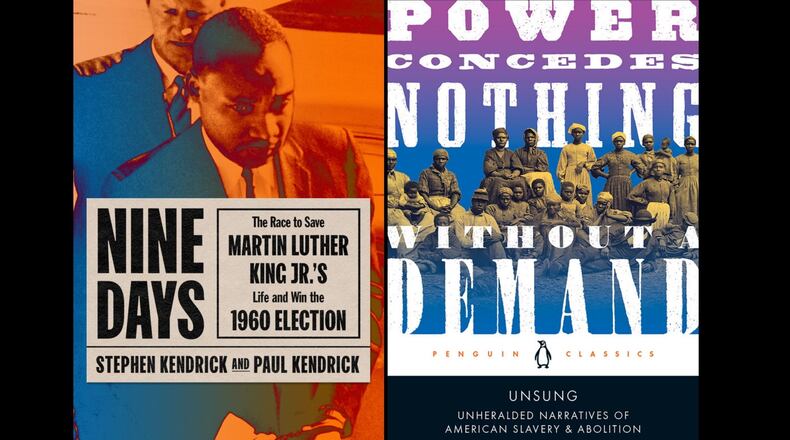Just in time for Black History Month, two intriguing new books bring fresh insights to two critical moments in U.S. history ― the civil rights movement and the antebellum era.
In October 1960, Martin Luther King Jr. and a handful of students from Morehouse College were arrested at Rich’s department store in downtown Atlanta for attempting to dine at the upscale Magnolia Room, where a signature item on the menu was the Plantation Salad. It was a planned protest and the participants fully expected to be thrown in jail. Organizers wanted to cast a national spotlight on segregation during the run-up to the presidential election between John F. Kennedy and Richard Nixon, which was just weeks away.
Five days later, then-Mayor William Hartsfield promised to negotiate an integration agreement with local business leaders and arranged for the protestors’ release, but King was detained. Turns out, he had an outstanding $25 traffic ticket in DeKalb County. For that minor infraction, he was sentenced to four months at the state’s notorious hard-labor prison in Reidsville. King eventually would be released after nine days, but a complex series of tense negotiations involving members of Kennedy’s campaign were required to secure his freedom.
That is the subject of “Nine Days: The Race to Save Martin Luther King Jr.’s Life and Win the 1960 Election” (Farrar, Straus and Giroux, $28) by father and son authors Stephen Kendrick and Paul Kendrick. In addition to giving a day-by-day account of the incident, the book builds the case that Kennedy’s role helped tip the black vote in his favor, winning him the election by a whisker.
According to the authors, who previously co-wrote “Douglass and Lincoln,” the unsung hero of the incident was campaign member Louis E. Martin, an African American journalist and advisor to three presidents. He, along with his colleagues Harris Wofford, who would go on to become a U.S. senator, and Sargent Shriver, Kennedy’s brother-in-law and founder of the Peace Corps, convinced Kennedy to call Coretta Scott King to express sympathy for her husband’s incarceration while they worked behind the scenes to release King.
“Nine Days” is an engrossing, well-researched examination of that overlooked slice of civil rights history worthy of closer scrutiny.
Publishing on Feb. 16, “Unsung: Unheralded Narratives of American Slavery & Abolition” (Penguin Random House, $22) is a collection of excerpts from more than 50 first-person accounts of life in the antebellum South told primarily by African Americans, both those who were enslaved and those born free.
It is the first in a series of books planned from the archives of the Schomburg Center for Research in Black Culture, part of the New York Public Library system. The foreword is written by poet Kevin Young, former director of the center. Edited by Michelle Commander, the collection is categorized into sections containing accounts of slave rebellions and insurrection, black abolitionist activities, slave escapes, the literary arts and the dawn of freedom.
A good place to start is the heart-pumping excerpt of “Running a Thousand Miles for Freedom; or, The Escape of William and Ellen Craft from Slavery.” Written in 1860 by William Craft, it tells the incredible story of the couple’s daring ruse to escape from a plantation in Macon in 1848.
With William’s help, Ellen, who was light-skinned, cut off her hair and dressed in menswear, posing as a white man traveling with a slave, who was, in fact, her husband. With Ellen’s face wrapped in a poultice to discourage conversation and her right hand in a sling to prevent from having to sign anything (she couldn’t write), they took a circuitous route aboard multiple trains and steamships to freedom in Massachusetts. The ploy was a success, and the Crafts were welcomed into Boston’s Black society where they became active abolitionists.
Illustrating how high the stakes were, the excerpt includes chilling accounts of punishments routinely doled out to runaway slaves who got caught. “Nothing seems to give the slaveholders so much pleasure as the catching and torturing of fugitives,” writes Craft.
Also noteworthy is an excerpt from “A Hairdresser’s Experience in High Life,” an 1859 account by Eliza Potter, a freeborn woman of mixed race who was a hairstylist for well-to-do white women. The position gave her rare access to the social and domestic goings-on among prominent white society. Her confidential tone is reminiscent of a visit to one’s own chatty hairstylist, but Potter’s tales include sickening accounts of elderly enslaved women worked to the bone and plantation owners too poor to feed or clothe their slaves but who put on a great show of affluence during the winter opera season in New Orleans.
Among her stories is one about a bank teller who marries a Black woman after he convinces a physician to “transfer some of her blood into his veins and then went to the court and swore he had colored blood in him.” In another, she recounts how an elderly enslaved woman routinely mistreated by her mistress meets her long-lost daughter by happenstance. Her daughter is a free woman, and when word gets out about their reunion, the entire community rallies to raise enough money for the woman to buy her mother’s freedom.
Just like the stories one hears at the hair salon, there’s no way to know which of Porter’s stories are true and which have been embellished over time. But that’s not really the point. The stories we tell ourselves, regardless of their accuracy, often reveal a greater truth about the reality of our experience than do simple facts.
Suzanne Van Atten is a book critic and contributing editor to The Atlanta Journal-Constitution. svanatten@ajc.com
About the Author
The Latest
Featured

